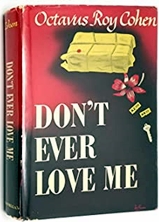Tue 19 Jan 2021
A 1001 Midnights Review: OCTAVUS ROY COHEN – Don’t Ever Love Me.
Posted by Steve under 1001 Midnights , Reviews[7] Comments
by Bill Crider

OCTAVUS ROY COHEN – Don’t Ever Love Me. Macmillan, hardcover, 1946. Popular Library #332, paperback, 1951.
Octavus Roy Cohen’s mysteries are slick and entertaining, smoothly written in a style that no doubt appealed to the readers of the Saturday Evening Post and other publications where many of his stories. appeared. Don’t Ever Love Me is a good example of his novel-length work, a light romantic mystery featuring a fairly liberated heroine, at least by the standards of 1946.
Lynn Sheridan, a successful copywriter for a New York advertising firm, is the victim of what seems to be a series of bizarre practical jokes: Someone calls the police to report her murder: someone calls an ambulance service to report that she has been badly hurt; and her escort to the opera is killed by a bullet that passes so close to her that she can hear it buzz by. Naturally all this puts quite a strain on Lynn and her fiancé, Alan Gordon.

To say much more about the plot would be unfair, but it involves two more murders and a goodly number of suspects. Cohen manages some adroit misdirection before Gordon, to the astonishment of the homicide detective on the case, manages to figure out just exactly what has been going on. And of course, it’s fun to consider the detective’s final words on the case in light of today’s methods of law enforcement: “The confession is what counts – not how you get it.”
Paperback collectors will find the cover of the 1951 Popular Library edition of Don’t Ever Love Me irresistible, even though the beautiful blonde with the dark eyebrows and the automatic pistol has nothing at all to do with the story.
Jim Hanvey, Detective ( 1923) is a collection of short stories that demonstrates Cohen’s ability in that form. And Cohen came up with the title Scrambled Yeggs (1934) years before Richard S. Prather.
———
Reprinted with permission from 1001 Midnights, edited by Bill Pronzini & Marcia Muller and published by The Battered Silicon Dispatch Box, 2007. Copyright © 1986, 2007 by the Pronzini-Muller Family Trust.
January 20th, 2021 at 11:30 am
What is remarkable is that there is not a single copy of the paperback to be found for sale anywhere online.
All existing copies must be in the hands of collectors.
January 20th, 2021 at 4:46 pm
Octavus Roy Cohen was prolific pulp writer before getting into the slicks and book publications.
January 20th, 2021 at 8:14 pm
Cohen was a pro of considerable finesse, but I always think of him as the writer of the Florian Slappy stories about a “comical” black private eye in an Amos and Andy mode.
A few of the stories aren’t bad, but they are broad and inappropriate, racist, and sadly were extremely popular in their day.
I haven’t noticed anything in most Cohen I read that was that bad, but those stories are what I think of when I think of Cohen, admittedly unfairly.
Cohen graduated from the pulps to a lucrative career in the slicks and was often adapted for Hollywood with Jim Hanvey played both by a well cast Guy Kibbee, and an unusually cast C. Aubrey Smith.
January 20th, 2021 at 9:06 pm
Cohen had quite a long career, starting with the pulps (such as BLUE BOOK) circa 1912, graduation to the slicks (SATURDAY EVENING POST), then hardcovers before ending up doing paperback mysteries for Gold Medal in the 1950s (and doing short fiction all the while).
If he’s remembered at all, though, I imagine it is mostly for his Florian Slappy stories, which he was still writing as late as 1950.
January 23rd, 2021 at 10:25 am
I miss Bill Crider’s book reviews. Bill had vast knowledge of crime fiction and a deft critical attitude. I’m not surprised no copies of the paperback edition are available online. I suspect this will become a more common situation in the years ahead.
January 23rd, 2021 at 10:59 am
The supply of old paperbacks from the 40s and 50s is drying up, that’s for sure. The problem for part time booksellers like me is that except for a very few old paperbacks, there is no demand for them either.
It’s the cover of the Cohen book that makes it collectible. I doubt that most of the collectors who own it have ever read it.
January 23rd, 2021 at 11:00 am
PS. I miss Bill and his witty incisive reviews too.